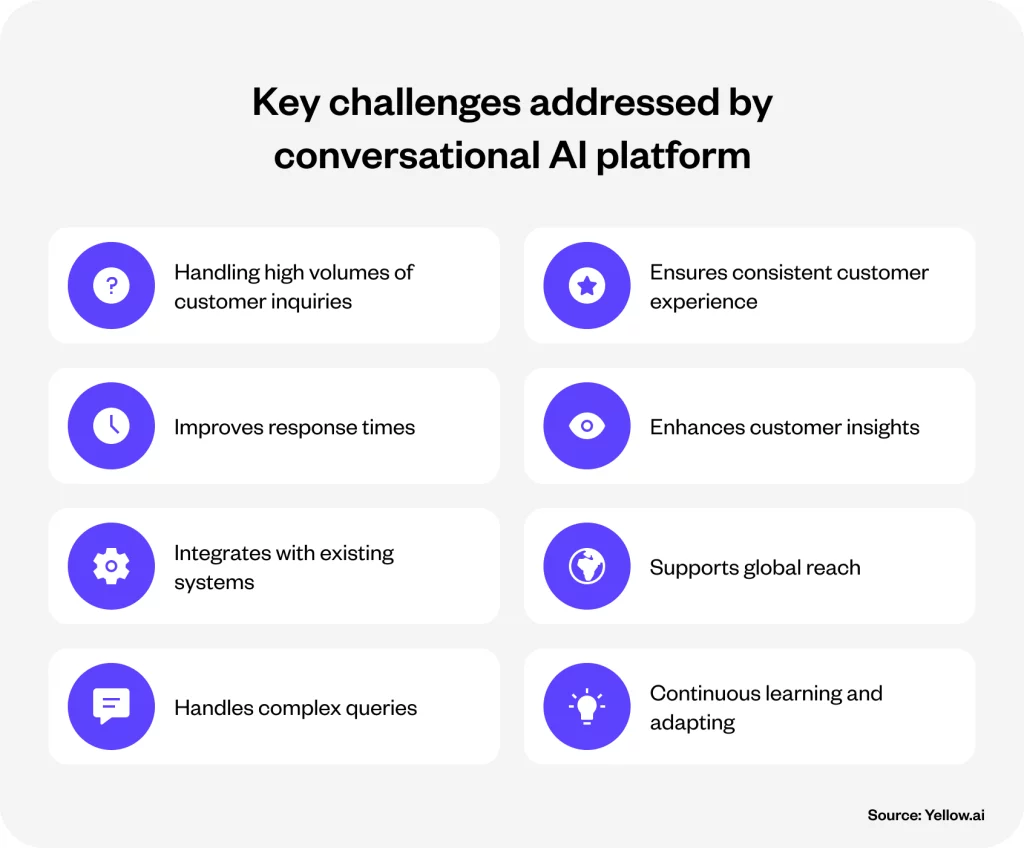In a rush and need the TL/DR version?
Summarize
As businesses embrace digital customer interactions, conversational AI tool have become crucial in delivering seamless and intelligent customer service. This blog explores 10 leading conversational AI platforms in 2024, including Yellow.ai, IBM Watson Assistant, Cognigy.ai, Kore.ai, AiseraGPT, Amelia, Ada.cx, and Boost.ai, which are transforming how businesses communicate with customers.
Key challenges addressed by conversational AI platforms:
- Efficient inquiry handling: Manages large volumes of customer interactions simultaneously, preventing the overwhelm of human agents.
- Consistent customer experience: Provides uniform and accurate responses, ensuring consistency across all interactions.
- Reduced response times: Offers instant automated replies, significantly reducing customer wait times.
- Enhanced customer insights: Utilizes advanced analytics to gain deep insights into customer behavior and preferences.
- Seamless system integration: It seamlessly integrates with existing CRM, ERP, and other enterprise systems, ensuring cohesive operations.
- 24/7 support availability: Ensures round-the-clock support, providing continuous assistance to customers.
- Multilingual support: Supports multiple languages, enabling effective communication with a global customer base.
- Complex query handling: Capable of understanding and responding to complex inquiries with contextually relevant solutions.
Yellow.ai stands out among top conversational AI platforms for its robust AI-driven features and seamless system integration. It enhances customer interactions with personalized responses and supports global reach through multilingual capabilities, making it an optimal choice for businesses aiming to improve efficiency and customer satisfaction.
Note: This summary is not a substitute for reading the article in full, as you may miss out on important nuances.
Conversational AI platforms have emerged as an integral part of modern customer service, which has primarily taken a digital-dominant mode. A whopping 90% of modern picky customers prefer the instant gratification offered by virtual assistants and chatbots. No wonder, these platforms offer seamless and intelligent customer service solutions by leveraging advanced technologies like natural language processing (NLP) and machine learning. More than 45% of consumers in the United States are interested in engaging with mobile applications using voice commands, highlighting the growing need for conversational AI in customer service.
In this blog, we’ll explore conversational AI platform’s meaning and significance in customer service, its benefits and key features. Stay hooked till the end, as you will find a comprehensive list of 10 best conversational AI platforms in 2024, shaping the future of customer interactions.
Related must-reads:
- Conversational AI for lead generation
- Conversational AI in retail
- Conversational AI in healthcare
- Conversational AI in insurance
- Conversational AI for Customer Service
- Conversational AI in banking
What is a conversational AI platform?
A conversational AI platform is a specially designed software that facilitates creating, training, and deploying self-service conversational tools such as chatbots, voice bots, and virtual agents. These platforms empower organizations to build intelligent and interactive AI agents capable of engaging in natural language conversations at scale. By offering a suite of tools, they enable businesses to develop comprehensive, multilingual bots, perform rigorous in-platform testing, and analyze bot performance with sophisticated algorithms.
The primary objective of a conversational AI platform is to ease and scale the development of conversational AI solutions. This allows businesses to provide reliable, 24/7 customer engagement, drive conversational commerce, and ultimately grow their revenue. Conversational AI can help your business by enabling:
- Multi-channel & multilingual support: Seamlessly operate bots across various channels and languages.
- Rigorous testing: Ensure bots accurately understand and respond to user intents.
- Performance analytics: Continuously enhance bot performance with advanced analytics.
- 24/7 automated support: Deliver round-the-clock automated customer assistance.
- Boost sales & engagement: Increase sales and customer engagement through interactive AI-driven conversations.
How does a conversational AI tool work?
A conversational AI tool operates through various advanced processes, harnessing machine learning and deep neural networks to enable seamless human-computer interactions. Here’s a step-by-step breakdown of how it works:
Input interface
Users begin by interacting with the tool either through text input or speech. For speech, Automatic Speech Recognition (ASR) or speech analytics convert spoken words into text, which the system can process.
Natural Language Processing (NLP)
Once the input is in text form, Natural Language Processing comes into play. This technology extracts the user’s intent from the text by breaking down the language into structured data that the AI can understand.
Natural Language Understanding (NLU)
NLU further refines this data by analyzing the text’s grammar, context, and meaning to comprehend the user’s intent and entities involved. It functions as the dialog management unit, ensuring the AI understands the user’s wants.
AI model and Natural Language Generation (NLG)
The AI model uses this structured data to predict the best response based on the user’s intent and the training data it has been provided. NLG then generates a human-like reaction, forming the output that the user receives.
This seamless interaction relies on a sophisticated interplay between input interfaces, NLP, NLU, and AI models, all of which can come from the same provider or different ones. For effective implementation, follow these steps:
- Identify use cases and organizational requirements.
- Define specific needs, desired interactions, and data collection criteria.
- Choose a top conversational AI platform.
- Develop and refine a prototype before full deployment.
- Launch with a small user group to test.
- Gather feedback and adjust accordingly.
- Continuously optimize by tweaking algorithms and adding features based on user feedback.
A robust conversational AI platform is essential to build an efficient, responsive, and user-friendly chatbot, creating an ecosystem that supports continuous improvement and adaptation.
Why do businesses leverage conversational AI software?
Conversational AI platforms have become a go-to solution for businesses looking to enhance their customer service, streamline operations, and boost sales. Conversational AI software is the need of the hour. These advanced tools offer numerous benefits that make them indispensable for enterprises looking to stay ahead. Here’s why businesses are leveraging conversational AI platforms.

1. Improves customer satisfaction
One of the primary reasons businesses adopt conversational AI software is to improve customer satisfaction. Automating customer service tasks such as answering frequently asked questions (FAQs), these platforms take the burden off the customer support agents and allow them to handle more complex issues and interactions.
With an enterprise conversational ai platform in place, the support team no longer needs to answer repetitive questions about business hours or refund policies. Instead, they can focus on resolving intricate issues and providing personalized assistance, which enhances customer satisfaction and loyalty.
2. Round-the-clock support
Best conversational AI platforms enable businesses to offer 24/7 customer service. Unlike human agents with limited working hours, conversational AI tools can handle customer inquiries at any time, ensuring that customers receive timely assistance regardless of when they reach out. This round-the-clock availability significantly boosts customer satisfaction and trust in the brand.
3. Decreases operational costs
Conversational AI companies provide solutions that can substantially reduce operational costs. By automating low-value, repetitive tasks, businesses can optimize their resources more effectively.
The reduction in operational costs extends beyond customer service. These AI-driven tools can also streamline other business processes, such as lead generation and qualification, order processing, and appointment scheduling. Businesses can operate more efficiently and allocate their resources more strategically by automating these tasks.
4. Boosts sales
Conversational AI platforms are not just about customer support but are also crucial in driving sales. For e-commerce businesses, conversational AI tools can act as virtual sales assistants, guiding customers through purchasing and answering real-time customer queries about products, shipping fees, and return policies. It can significantly reduce cart abandonment rates and increase conversion rates.
5. Personalized customer experience
Conversational AI software can personalize the shopping experience by recommending products based on customer preferences and previous interactions. This level of personalization can lead to higher customer engagement and increased sales. By integrating conversational AI into the sales funnel, businesses can ensure that potential customers receive the information they need to make informed purchasing decisions, boosting sales and revenue.
Related read: How to improve customer experience?
6. Expands global reach
With the ability to develop multilingual bots, conversational AI platforms help businesses cater to a global audience. This capability ensures that customers from different linguistic backgrounds can interact with the business in their preferred language, enhancing the overall customer experience and broadening the business’s market reach.
Key challenges addressed by conversational AI platform
Conversational AI platforms address key challenges and several common pain points for businesses. These include the inefficiency or decreasing productivity of human agents handling repetitive tasks, the absence of round-the-clock support, and low conversion rates due to unanswered customer queries during checkout. Here is an extensive list of challenges handled by conversational AI software

- Handling high volumes of customer inquiries
Conversational AI tools can manage large volumes of customer interactions simultaneously, ensuring that all inquiries are addressed promptly and efficiently without overwhelming human agents.
- Ensures consistent customer experience
Conversational AI platforms provide uniform and accurate responses, ensuring a consistent customer experience regardless of when or how customers engage with the business.
- Improves response times
With instant response capabilities, conversational AI tools drastically reduce wait times, enhancing customer satisfaction and engagement by providing immediate assistance.
- Enhances customer insights
Best conversational AI platforms offer advanced analytics and reporting, delivering businesses with valuable insights into customer behavior and preferences. Such data can be used to refine strategies and improve service.
- Integrates with existing systems
Conversational AI companies design their platforms to integrate seamlessly with existing CRM, ERP, and other enterprise systems, ensuring a smooth workflow and cohesive customer data management.
- Supports global reach
Conversational AI platforms support multiple languages, enabling businesses to serve a global customer base effectively and break down language barriers.
- Handles complex queries
Advanced conversational AI tools can understand and process complex customer inquiries, providing accurate and contextually relevant responses that enhance the overall customer experience.
- Continuous learning and adapting
Enterprise conversational AI platforms continuously learn from interactions, improving their accuracy and effectiveness over time, which helps in delivering better service and anticipating customer needs.
10 Best conversational AI platforms in 2024 for customer service
Are you looking for the best conversational AI platform software in 2024? Then you have landed in the right place. Here, we have listed the top 10 enterprise conversational AI platforms that can be a perfect fit for your business. Analyze their features, advantages, and limitations and pick the most suitable one.
Top 10 conversational AI platforms in 2024
Yellow.ai
Yellow.ai is a battle-tested enterprise-grade conversational AI platform for leading brands including Sony, Domino’s, Hyundai, Lion Parcel, Pelago, Waste Connections, Randstad, Tiket.com, Papa Johns, and more, across the globe. Yellow.ai is an AI-first customer service automation platform for over 1100 customers in 85+ countries. It offers enterprise-level generative AI-powered solutions and conversational AI toolkits. Its Dynamic Automation Platform built on multiple LLMs, helps organizations build highly bespoke and unique human-like experiences.
Yellow.ai also includes insights and analytics for further insights into customer behavior and satisfaction. Its multi-LLM architecture ensures exceptional performance, and as it is continuously refined through billions of conversations, it excels in scalability, speed, and accuracy. Yellow.ai, one of the best conversational AI platforms, effectively slashes operating costs by automating conversations across various channels, including email, text, and voice.
Such customer stories and social proofing vouch for Yellow.ai’s prowess as a leading conversational AI platform in 2024. Let’s explore its top features which set it apart from the rest!
- First-of-its-kind customer service automation
With the multilingual AI powered customer service automation platform Yellow.ai allows the business to excel in customer service automation. It helps deliver automated yet incredibly human-like customer experiences at scale throughout the customer’s journey.
- Multilingual support
The conversational AI chatbots and voice agents are trained to interact and respond in over 135 languages to cater to a global audience. This hyperlocal regional language communication enhances a business’s reach and boosts customer satisfaction.
The industry’s first foundational LLM trained on 8.5B + Indonesian and local language tokens, Yellow.ai Komodo-7B, supports 11+ regional languages.
- Unified omnichannel experience
Yellow.ai’s omnichannel automation can help your contact center provide a uniform experience regardless of the channel the customer uses. This service is enabled for more than 35 channels.
- Advanced NLP and ML
It uses cutting-edge natural language processing and machine learning for accurate intent recognition.
- Goal-based conversation
YellowG, the first generative AI-powered conversational automation platform, delivers human-like, engaging, and gratifying conversations. One of its highlights is Goal-based Conversations driven by generative AI.
- Customizable chatbots and voice bots
It allows businesses to create highly tailored AI and Gen-AI powered chatbots and voice bots suited to specific use cases and industry needs.
- 60% decrease in operational expenses
Yellow.ai, as a prominent conversation AI platform, can save operational expenses of customer service by 60%. Thanks to its human-like voice automation. It extends seamless CX by responding to customer queries instantly and accurately.
- Plug and play integration
Yellow.ai’s conversational AI platform has preconfigured connectors for SIP/MRCP connections, allowing for a faster and more efficient go-to-market approach. Simply plug it in and start using it.
- Contextual customer conversations
Yellow.ai Orchestrator LLM, an industry-first Generative AI-powered agent model with zero training, adapts to user conversations to provide a pleasant customer experience. It revolutionizes customer service by retaining context, evaluating the entire interaction and eliminating abrupt ends. It integrates easily with CRM, ERP, APIs, and knowledge bases.
Yellow.ai has been a leading player in enabling businesses to drive accurate, human-like conversations, and their latest feature – Orchestrator LLM – is a testament to this. By understanding the complete context and deciding the next course of action based on a user’s request, it truly changes the way chatbots can converse with users.“
– Jessica Osborn, Randstad
- Enterprise-grade security
Yellow.ai’s tools require minimal setup and configuration, and leverage enterprise-grade security features for privacy and compliance.
- Works in unison
Yellow.ai, as a conversational AI platform, can work alongside its other conversational services, employee experience, commerce cloud systems, and external apps.
Yellow.ai pricing
Features
No of bots
Channels
Custom integrations (APIs)
Custom dashboards (data explorer)
Agents limit
Out-of-box integrations
MTU
User360
Campaign management
Code access
Custom events
Free
1
2
1
2
Limited
100/month
Max 1000 records
1000 transactions
1 active campaigns
Max 10 templates
Enterprise
Unlimited
All
Unlimited
Unlimited
Unlimited
Usage based pricing
Unlimited 1000 transactions
per user FU
Unlimited active campaigns
Unlimited templates
IBM Watsonx Assistant
IBM WatsonX Assistant is a conversational AI solution that uses large language models and an intuitive user interface to build voice agents and chatbots for automated self-service. It streamlines traditional assistance processes and allows companies to integrate AI chatbots into their existing customer service and team productivity tools.
The visual toolkit allows users to start building without coding knowledge, and they can even customize the AI assistant’s voice to match their brand.
Key features:
- Natural language processing
- Agent assist tools
- Comprehensive data and privacy capabilities
- Highly advanced AI chatbots for better CX
- Customizable AI voice chatbot tone for a clear and inviting interface
Cognigy.ai
Cognigy.ai is a conversational platform that automates contact centers for employees and customers. The platform integrates with existing backend systems, allowing users to design bespoke conversational flows and customize virtual assistants or chatbots. Cognigy.AI is low-code, meaning users need coding knowledge or developer friends to use it effectively.
Key features:
- Supports over 100 languages and real-time translation
- Foster customer loyalty and create meaningful connections
- Developing AI agents that are suited to business needs
- Integrate seamlessly with current systems.
- Simplified creation of AI agents for customer and agent assistance
- AI coaching in real time to empower employees
Kore.ai
Kore.ai is a conversational AI platform enabling businesses to create virtual assistants for customer and employee experiences. The platform offers a complete conversational AI platform for customization and assistance in various industries.
The Kore.ai Experience Optimization (XO) Platform helps businesses build, train, and deploy virtual assistants and intelligent chatbots.
Key features:
- Supports more than 100 global languages
- Auto-dialogue production
- On-premise, cloud, hybrid implementation
- Conversational IVR
- Works with 75 prebuilt CRM, ERP, ITSM, and NLM workflows
Amelia
Amelia conversational AI platform uses NLP technology and Generative AI models to create natural conversations for businesses. It offers 24/7 access to IVAs in 100+ languages, guiding complex interactions and automating business processes.
Amelia’s has generative AI capabilities, LLMs, and workflow builders for automating customer and employee experiences. The platform can adapt to industry features and compliance needs, requiring minimal coding knowledge, and has intelligent reporting and analytical tools.
Key features:
- Users can use Amelia’s LLMs or incorporate their models into the system
- Expertise in natural language and complex conversations
- Synchronizes with CRMs and other corporate apps
- Helps you get started fast with industry-specific solutions
Ada.cx
Ada.cx is a conversational AI platform that automates and enhances customer service interactions. It uses NLP to discern and respond to customer inquiries in real time. The platform excels in providing personalized, context-aware responses, ensuring high levels of customer satisfaction. The platform helps businesses reduce operational costs, improve customer engagement, and streamline support processes by automating routine tasks.
Key features:
- Real-time, personalized customer interactions
- Easy-to-use interface for chatbot creation and management
- Integrates with popular CRM and support systems
- Detailed analytics and reporting for performance insights
- Supports multilingual capabilities
Did you know that, unlike most conversational AI platforms
Boost.ai
Boost.ai is a conversational AI platform that offers cloud-based and on-premise solutions for various industries, including banking, telecom, and retail. Using a no-code system allows brands to build enterprise-ready bots and generative AI assistants with minimal complexity. The platform uses generative AI technology, machine learning, and natural language understanding for voice and chatbots. It has a user-friendly interface for chatbot development, and also provides tools for monitoring insights and metrics from bot interactions.
Key features:
- A centralized information repository
- Authentication management
- Pre-defined templates
- Language detection
- Conversational IVR
- AI-enabled admin panel
- Supports omnichannel capabilities
- Sentiment analysis tools
Sprinklr
Sprinklr’s conversational AI platform offers seamless self-service through chat and voice bots. It features conversational analytics, allowing customers to resolve issues swiftly and personalizing the bot experience.
It supports omnichannel and multilingual needs. Sprinklr’s intelligent handling of out-of-context queries, in-platform testing, and contextual conversations further enhance customer journeys.
Key features:
- Contextual conversations
- Conversational commerce
- In-platform testing
- Conversational analytics
Haptik.ai
Haptik is a conversational AI platform designed to help businesses in telecom, travel, hospitality, financial services and eCommerce industries manage customer experiences using omnichannel virtual assistants. Professionals can include various elements including menus, quick replies, image carousel, store locator and chatbot prompts, among others to improve the user interface according to requirements.
Key features:
- Interactive UI
- Adoption of advanced AI and NLP
- Abundance of deployable features
- Reliability in terms of uptime
LivePerson
LivePerson Conversational Cloud is an AI platform designed to automate conversations, improving corporate operational efficiency. It offers conversational AI solutions across multiple channels, and also features built-in security and safety guardrails to ensure compliance. It also allows for the creation of conversational AI tools tailored to team members’ needs, simplifying repetitive tasks.
Key features:
- Multichannel support
- Advanced language models
- Security and compliance guardrails
- Insights and dashboards
Conversational AI platforms: Key takeaways
Conversational AI platforms have caused a seismic shift in how businesses interact with customers by automating and enhancing communication across various channels. These platforms utilize advanced technologies like NLP and ML to create intelligent chatbots and virtual assistants. Throughout this blog, we discussed the meaning of conversational AI software and its numerous benefits. We also explored the challenges these tools address, including handling high volumes of inquiries and providing 24/7 support.
Future conversational AI software trends emphasize increasingly sophisticated AI models that can handle complicated, context-aware interactions more accurately. The global conversational AI niche was projected to demonstrate a CAGR of roughly 18.9% from 2021 until 2030, become multi-billion vertical and be valued at $32.62 billion. We can expect enhanced personalization, deeper integration with IoT devices, and expanded multilingual support. Furthermore, voice recognition and emotion detection advancements will make AI interactions more human-like and intuitive. Conversational AI tools will help firms satisfy customers’ changing requirements, giving them a competitive edge.
Now you are better equipped to pick the suitable conversational AI software. To experience how it works get on 1:1 with Yellow.ai. You are just a free demo away!
Conversational AI – FAQs
How does conversational AI differ from traditional chatbots?
Traditional chatbots function within a set of predetermined rules and furnish answers based on predefined keywords. They have restricted abilities and cannot respond to questions outside their programmed parameters. Conversational AI, on the contrary, brings a more human touch to interactions.
How can conversational AI platforms enhance customer experience?
Unlike standard chatbots, which harness workflow logic to respond to customers, conversational AI is designed to have dynamic conversations. These interactions are logged automatically for managers to review, giving business leaders detailed descriptions of every customer experience.
What are the different types of conversational AI?
There are mainly four primary types of conversational AI, and the list includes chatbots, voice and mobile assistants, interactive voice assistants (IVA) and virtual assistants.
What is the difference between chatbot and conversational AI?
The dissimilarity between chatbots and conversational AI is very subtle. Usually, a chatbot focuses on automating a specific set of tasks. Conversely, conversational AI is a broader term, and it often focuses on simulating human conversations in a more advanced way.
How big is the conversational AI industry?
The conversational AI industry is massive and constantly growing. This market is evaluated to be valued at USD 10.65 Bn in 2024 and will reach USD 44.38 Bn by 2031, expanding at a CAGR of 22.6% from 2024 to 2031.
What problem does conversational AI solve?
Conversational AI solves several customer service problems, making it easier and faster for customers to get answers to simple questions. It supports agents as they get fewer tickets to resolve. Conversational AI frees CS agents to address the complex questions that chatbots and virtual assistants can’t handle. The conversational AI aims to understand and discern human speech and conversational flow. One can configure it to respond appropriately to different query types and not answer questions out of scope.


















